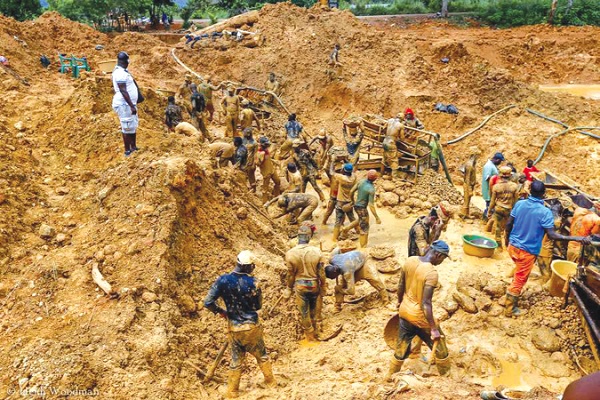
Climate change and Ghana’s natural environment: What can be done? (2)
Professor Jeffery Haynes
Both main parties, the New Patriotic Party (NPP) and the National Democratic Congress (NDC), published their manifestos in August 2024, prior to presidential and parliamentary elections on December 7.
. Both parties’ manifestos contain sections on the natural environment, including addressing climate change and proposed measures more generally to protect Ghana’s environment. This article looks at those policies in detail and assesses which party has the best policy on the natural environment.
The NPP manifesto and the environment
The NPP’s manifesto has a section entitled: ‘Protect Our Environment’. It highlights the need to enhance the protection of Ghana’s forests and biodiversity hotspots, as well as to take steps to restore the country’s forests through dedicated reforestation programmes.
The NPP would do the following to accomplish these goals: target 30,000 hectares (ha) of degraded areas for reforestation and plantation development annually, establish 1,000 ha of bamboo and rattan plantations annually for watershed protection and plantation development, and provide tree seedlings and plantain suckers ‘to a minimum of 1000 communities’ to enhance a national reforestation and plantation development programme.
The NPP manifesto also pledges to start a ‘Golden Age for Ghanaian-Owned Small-Scale Mining for Wealth and Jobs’.
This would involve promotion of responsible and sustainable small-scale mining and addressing the scourge of galamsey, that is, illegal small-scale mining, with its damaging environmental impacts. In power, the NPP would take the following measures: (1) make available proven reserves data to small-scale miners to help deal with the associated problem of trial-and-error digging for gold, (2) simplify the small-scale mining licensing regime, (3) scale-up the use of mercury-free Gold Catcher machine technology, which is less damaging to the environment than mercury-based methods, and (4) ensure strict adherence to Ghana’s mining laws and regulations.
These measures would facilitate prevention of illegal and improper mining practices, as well as protect and preserve Ghana’s water resources. The latter would also be facilitated by vigorously protecting both surface and underground sources through enforcement of the provisions of the Water Use Regulations, reviewing and strengthening the Water Buffer Zone Policy for implementation, protecting transborder water sources, notably the Volta River, and effectively managing all major water basins in Ghana
The NDC manifesto and the environment
The NDC manifesto’s section on the environment is entitled: ‘Sustainable Environment and Extractive Sector Management’. The manifesto points out that Ghana is endowed with rich biodiversity, vast natural resources and resilient people. At the same time, the country faces significant environmental challenges that require bold and innovative solutions, and a strong commitment to environmental sustainability. The NDC manifesto states that Ghana must do more to protect the environment for the benefit of present and future generations. In power, the NDC would accomplish this by ‘reasonable legislative and administrative measures’.
The NDC manifesto alleges that the present NPP government ‘has harmed the environment by allowing increased illegal mining activities, with political figures heavily implicated’. The manifesto also notes that there have ‘been attempts to privatise forest reserves such as the Achimota Forest’ during the tenure of the present government.
The NDC commits to strengthening the resilience of social and economic infrastructure to address the consequences of climate change. Such measures include enhancing sinks of greenhouse gases and, more generally, promotion of sustainable economic growth for Ghanaians’ sustained well-being. In addition, the NDC pledges to empower local communities, particularly the youth and women, to ‘participate actively in climate protection and air quality initiatives’, and foster a culture of sustainability and resilience that will benefit current and future generations.
Comparing the manifestos on the environment
Both manifestos are long on proposals to sustain and enhance Ghana’s natural environment. Both parties commit to tackling the scourge of galamsey, protecting Ghana’s forests and empowering local communities in various ways to address and deal with the consequences of climate change.
Does either party look like they would take the natural environment seriously if in power following the elections on December 7?
Successive governments, both NDC and NPP, have presided over serious environmental damage in Ghana. For example, air, water and waste pollution are major environmental challenges. Air pollution is Ghana’s number one environmental risk to public health and the country’s sixth-ranked overall risk (out of 19) for death.
Ghana is at risk from droughts, coastal erosion, floods and landslides, environmental crises with socioeconomic impacts. In addition, Ghana is noted for poor agricultural practices, surface mining, desertification, climate variability and change, pollution due to the absence of waste treatment, and ineffective management. All of these have a negative impact on the country’s natural environment.
Like many countries, Ghana is now waking up to the challenge that environmental degradation and damage is doing to the country’s sustainable future. Both parties’ 2024 manifestos say the right things about protecting the environment. Critics might say that without robust policies and sufficient financial resources, neither potential government, NPP or NDC, is proposing to do enough to slow down much less eliminate threats to Ghana’s well-being from environmental destruction. Civil society organisations must do more to put Ghana’s government on the spot over environmental failures. Future generations will not forgive those in power today if they inherit an unsustainable environment due to inaction.
The writer is an Emeritus Professor of Politics, London Metropolitan University, UK
